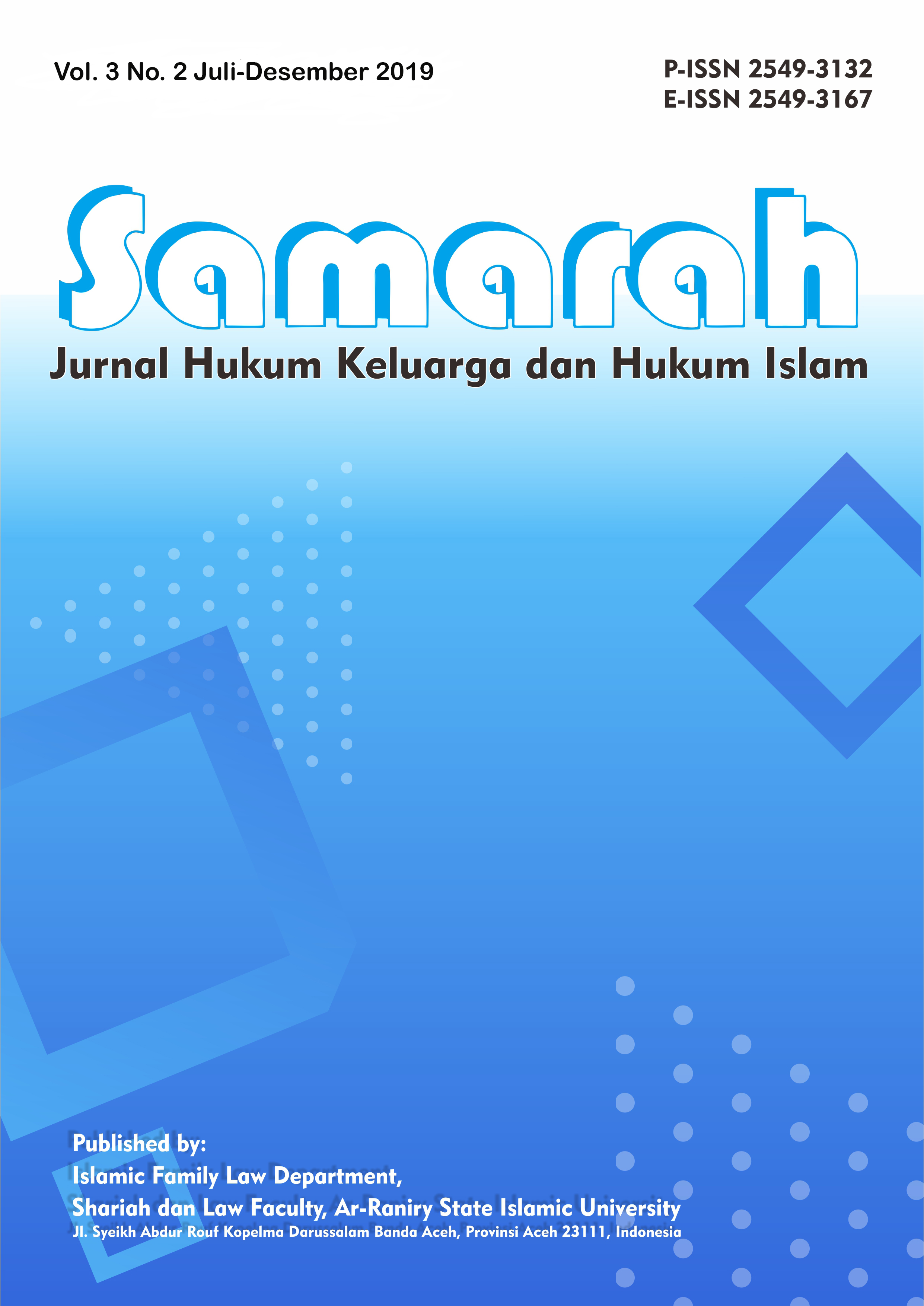Pandangan Tengku Gampong tentang Wali Fasik dalam Pernikahan: Studi Kasus di KUA Kecamatan Blangpidie, Abdya (Tengku Gampong's View on Fascical Guardians in Marriage: Case Study in KUA Blangpidie Subdistrict, Abdya Regency)
DOI:
https://doi.org/10.22373/sjhk.v3i2.4398Keywords:
The view of Tengku gampong, the Guardian, the marriage.Abstract
In marry children women, wali (guardian) not be wicked and the majority of scholars requires guardian should fair. However, in community still found practice guardian marriage wicked, especially in district Blangpidie, district Abdya. Thera are three questions research in research this article, first, how procedure wedding at kua district Blangpidie, district Abdya, second, how view tengku gampong district Blangpidie about guardian wicked in wedding, third, what reason dan evidence law that used tengku gampongs and the KUA. to answer problem in tihis research, it will be done with approach case study. The data collected through observation dan interview. Data research analyzed an qualitative with method deskritif-analysis. Results research show first, implementation wedding at kua district Blangpidie done with five procedure, i.e; preparation marriage notice will marriage examination file marriage announcement will marriage implementation contract marriage good at kua or in out KUA. second, did tengku gampong district Blangpidie, the person who wicked like not implement prayer five time, gamble dan drunkenness be be guardian in wedding. Guardian marriage not obeyed fair, which is important is religious Islam puberty dan rational. third, reason dan evidence law that used tengku gampong and the KUA district Blangpidie in set law guardian wicked in wedding have two, i.e; opinion scholars jurisprudence that allow guardian the marriage wicked marry children, not of rules that firmly in regulations legislation about terms guardian should fair dan not wicked. did tengku gampongs and the KUA district Blangpidie, law marriage dan compilation law Islam only requires guardian should religious Islam aqeel dan puberty.
References
Abdul Aziz Dahlan, EnsiklopediHukum Islam, Jakarta: PT IchtiarBaru van Hoeve, 2003.
Departemen Pendidikan dan Kebudayaan, Kamus Besar Bahasa Indonesia, (Jakarta: BalaiPustaka, 1989.
Syaikh Shafiyyurrahman al-Mubarrakfuri, Tafsir Ibnu Katsir, (terj: Muhammad Thalib), (Jakarta: Yayasan Islam Ahlus-Shuffah & Pusat studi Islam an-Nabawi, 2010.
HMA. Tihami dan Sohari Sahrani, Fikih Munahakat: Kajian Fikih Nikah Lengkap, cet. iii, Jakarta: Rajawali Pers, 2013.
Amir Syarifuddin, Hukum Perkawinan Islam di Indonesia: Antara Fiqh Munakahat dan Undang-Undang Perkawinan, cet. 2, (Jakarta: Kencana Prenada Media Group, 2012.
Abdul Madjid Mahmud Mathlub, al-Wajīz fī Aḥkām al-Usrah al-Islamiyah, ed. In,PenduanHukumKeluargaSakinah,terj: HaritsFadhly& Ahmad Khotib, Surakarta: Era Intermedia, 2005.
Wahbah Zuhaili, Fiqh Islam Waadillatuhu: Pernikahan, Talak, Khulu’, Ila’, Li’an, Zihar dan Masa Iddah, (terj: Abdul Haiyyie Al-Kattani, dkk), jilid 9, (Jakarta: Gema Insani, 2011.
Wawancara dengan Zakaria, Tengku Imum Gampong Geulumpang Payong, Kecamatan Balang Pidie, Abdiya, pada tanggal 21 Desember 2017.
Wawancara dengan Zulkifli, Tengku Imum Gampong Kuta Tinggi, Kecamatan Balang Pidie, Abdiya, pada tanggal 19 Desember 2017.
Wawancara dengan Hasan, Tengku Imum Gampong Kuta Bahagia, Kecamatan Balang Pidie, Abdiya, pada tanggal 23 Desember 2017.
Wawancara dengan Muhammad Slamet, Kepala KUA Kecamatan Blangpidie, tanggal 22 Desember 2017.

Downloads
Published
Issue
Section
License
Authors who publish in Samarah: Jurnal Hukum Keluarga dan Hukum Islam agree to the following terms:
- Authors retain copyright and grant the journal right of first publication with the work simultaneously licensed Attribution-ShareAlike 4.0 International (CC BY-SA 4.0) that allows others to share the work with an acknowledgment of the work's authorship and initial publication in this journal.
- Authors are able to enter into separate, additional contractual arrangements for the non-exclusive distribution of the journal's published version of the work (e.g., post it to an institutional repository or publish it in a book), with an acknowledgment of its initial publication in this journal.
- Authors are permitted and encouraged to post their work online (e.g., in institutional repositories or on their website) prior to and during the submission process, as it can lead to productive exchanges, as well as earlier and greater citation of published work. (See The Effect of Open Acces)









